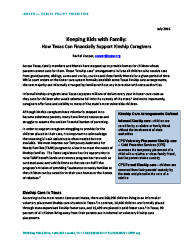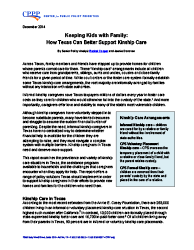Kids Living with Relatives
(Kinship Care)
Over 250,000 children in Texas are raised by a grandparent or other relative.
Across Texas, family members and friends have stepped up to provide homes for children whose parents cannot care for them. These “kinship care” arrangements include all children who receive care from grandparents, siblings, aunts and uncles, cousins and close family friends for a given period of time.

Background
While court orders or the foster care system formally establish some Texas kinship care arrangements, the vast majority are informally arranged by families without any interaction with state authorities.
Despite the hardship and adverse conditions that families experience, kinship caregivers have a significant positive impact on the children they welcome. Research shows that kinship care placements are often preferable to non-kinship foster care because they provide the child with a sense of family support and familiarity.
Unfortunately, 90 percent of children who do not live with their parents are in informal kinship care. Therefore, they do not receive the same support as children involved with the state, although they are often in similar situations of financial, social, and emotional distress. While they may be eligible for some public benefits like Medicaid and the Supplemental Nutrition Assistance Program (SNAP), the only cash support program available, TANF, is woefully inadequate.
In order to support caregivers struggling to provide for the children placed in their care, it is important to acknowledge that meaningful cash assistance is often needed but not available. To learn more about TANF and how it works, click here.
Related Resources

Do it for Texas kids, Gov. Abbott
Dear Governor Abbott: Congratulations on your inauguration as the governor of our great state. As a fellow Texan, parent, and attorney, I know we agree


